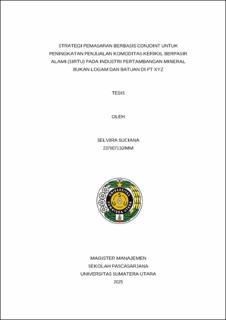Strategi Pemasaran Berbasis Conjoint untuk Peningkatan Penjualan Komoditas Kerikil Berpasir Alami (Sirtu) pada Industri Pertambangan Mineral Bukan Logam dan Batuan di PT XYZ
Conjoin-Based Marketing Strategy to Increase of Natural Sandy Rocks (Sirtu) Commodity in the Non-Metalic Mineral and Rock Mining Industry at PT XYZ

Date
2025Author
Suciana, Selvira
Advisor(s)
Wibowo, Rulianda Purnomo
Sembiring, Beby Karina Fawzeea
Metadata
Show full item recordAbstract
The significant decline in sales of natural gravelly sand (sirtu) at PT XYZ during January–December 2024 negatively impacted the company’s revenue and the prospects of future mining permit extensions. This decline is suspected to be caused by a mismatch between the offered product and consumer preferences, including product type, price, purchase volume, delivery transportation, purchasing services, and payment methods. This study aims to identify the key factors influencing purchasing decisions, analyze consumer preferences using conjoint analysis, and formulate an appropriate marketing strategy. A descriptive and explanatory quantitative approach was used, employing purposive sampling with 25 respondents. Data were collected through a conjoint analysis-based questionnaire and analyzed using SPSS Statistics Version 30. The results indicate that the most preferred product attribute combination includes: medium-quality sirtu, medium price (Rp 200,000–270,000/m³), medium purchase volume, delivery using medium-sized dump trucks (6–8 m³), direct purchase, and Cash on Delivery (COD) payment method, with a total utility score of 1.638. Among the six attributes, the payment method had the greatest influence (24.326%), followed by purchase volume (20.096%) and delivery transportation (18.523%), while purchasing services had the least influence (6.247%). There were differences in consumer preferences across segments, with construction companies prioritizing transportation and price, while individual consumers emphasized payment methods and purchase volume flexibility.
